- Home
- Brian Falkner
Clash of Empires Page 4
Clash of Empires Read online
Page 4
“You have either found her or not,” Willem says, a little more brusquely than he intends.
“I have,” Frost says.
“She is alive? She is in good health?” Willem asks. “I need her for the mission. She is the only one who knows the way through the caves.”
“She is alive, and well in body,” Frost says reluctantly. “The doctors do not say the same for her mind.”
“She never belonged in that place,” Willem says.
“I agree,” Frost says. “But the doctors have their own view. And now…”
“Where is she?” Willem asks with sudden concern.
“Héloïse’s identity and whereabouts have been kept most secret,” Frost says. “As have yours.”
Willem nods his understanding. The French have many spies in England.
“But Héloïse was recognized,” Frost says. “Another patient at St. Luke’s was the widow of a British officer. This lady was at her husband’s side at Waterloo, and by his deathbed in the field hospital in your village.”
Willem is not surprised to hear that the officer’s widow had lost her mind. What he witnessed in the makeshift hospital in the aftermath of Waterloo was enough to drive anyone to madness.
“For security, the High Command decided to move Héloïse to another … location,” Frost says.
Willem wants to ask more but refrains as the six lieutenants approach within earshot and form a line in the center of the parade ground, directly in front of where Willem, Frost, and Jack are standing. They look expectantly at Willem.
“Load,” Willem orders.
The soldiers draw their flintlock pistols. They feel for powder cartridges in their leather pouches, insert them, and ram them home.
“Ready,” Willem calls.
At the start line, the gun crews lift the trails of the carriages, lowering the heads of the wooden saurs. Some soldiers take hold of the wheels.
“Attack!” Willem calls.
The soldiers strain and the trojansaurs begin to move, slowly at first, but increasing in speed. The soldiers gasp and grunt, calling encouragement to one another. At the other end of the parade ground the lieutenants wait, raising their pistols as the trojansaurs approach. Faster and faster the carriages rush down the parade ground.
As they draw closer, the soldiers holding the trails of the carriages lift them higher, lowering the heads as if they are stooping to attack.
The pistols sound, a ragged series of cracks, and from each muzzle spurts a cloud of pepper, enveloping the oncoming wooden heads.
This is the real point of the exercise. The “race” is merely to add speed and urgency. The officers must learn to stand their ground in front of a charging battlesaur, holding their nerve until the beast is within range of their pepper cartridge.
The lieutenants leap to the side, crouching down out of the path of the carriages and reloading as the trojansaurs rumble slowly to a stop.
“Lieutenant McConnell, I declare you the winner,” Willem says, not without some reluctance. McConnell’s trojansaur, Harry, was a foot in front as the wooden beasts crossed the line.
McConnell struts and preens as if it was he who had pushed the carriage, not his men. Willem observes a few sour expressions and rolled eyes among his gun crew and thinks McConnell would have been wiser to thank them than to steal their glory.
“Is that it?” Frost asks.
“Two more races to go,” Willem says. “Best of three, then a final if there is no clear winner.”
The gun crews drag the trojansaurs back to the start line. The lieutenants follow, to give instruction and encouragement.
“Where is this other location?” Willem asks. “You sound uneasy.”
“It is very old and has a dark history,” Frost says.
“Then we must go to her,” Willem says. “Today.”
“Willem, I understand your desire to see her,” Frost says, “but the doctors say she is unwell.”
“She is not mad,” Willem says. “She is just odd. As would you be if you had lived for so many years alone in a forest cave.”
“The doctors say differently,” Frost says.
“You owe her your life!” Willem says, aware of the heat in his voice. “We all do. Have you forgotten our narrow escape from Antwerp?”
“We owe her a great debt,” Frost says. “But that does not heal her illness.”
“It is more than that,” Willem says. “The mission cannot succeed without Héloïse. Only she knows the secret forest paths and the ways through the underground tunnels.”
“We do not even know for sure that your mother and Cosette are at the abbey in the Sonian Forest,” Frost says.
“It was you who told me they were,” Willem says, angry now, despite himself. “Do you doubt your own spies?”
“I believe the information was good,” Frost says. “But they could have been moved.”
“And wouldn’t your spies know if that was so?” Willem asks.
“Most probably,” Frost admits.
“What do you know that you are not telling me?” Willem demands.
“It is not my place to talk about your mission,” Frost says.
“I ask you not as an officer, but as my friend,” Willem says quietly.
They fall silent as the lieutenants line up once again in front of them.
This time Lieutenant Patrick, a round-faced man, wins it by a nose. It earns him a sour look from McConnell. Patrick congratulates his crew, shaking each of them by the hand.
“Race three,” Willem calls, and the gun crews haul the trojansaurs back to the starting line.
He turns to stare at Frost, who seems aware of it.
“Willem, there is talk that your mission will be canceled,” Frost says.
Willem draws in a sharp breath.
“That cannot be! I have an agreement with the Duke of Wellington himself,” Willem says. “I trust the honor of a British officer, a nobleman, in upholding his promises.”
“Promises he may find it hard to keep,” Frost says. “This is the news I dreaded telling you. Word has come that Napoléon encamps his army in Calais. An invasion of England is imminent.”
“An agreement is an agreement,” Willem says.
“Until it is not,” Frost says. “He will need every man to resist the invasion.”
“He is coming tomorrow for the rocket demonstration,” Willem says. “I will ask him about it then.”
“And if he says no?” Frost asks.
“Then I will go on my own,” Willem says bitterly.
“Not on your own,” Frost says, and smiles.
Willem breathes in deeply and exhales his aggravation in a soft white mist. He finds that he has clenched his fists, and slowly relaxes them. His anger is misdirected. And Frost is wrong. The duke will not go back on their agreement. Willem is sure of it.
The third trojansaur race begins, but halfway down the course one of McConnell’s men trips and falls. The man behind him stumbles over him and falls also. Their carriage slews to the side and the trojansaur comes to a brief stop before the men pick themselves up. They resume the race, but well behind.
Five out of the six pistols sound. Five of six trojansaurs cross the finish line. Lieutenant Patrick’s team again is in front. Willem is about to declare them the overall winners when McConnell lowers his pistol and draws his sword. Before Willem can say anything McConnell rushes at Harry, yelling an incoherent war cry.
He reaches high and slashes up at the wooden face using both hands in a powerful strike. Paint and wood chips fly.
“Lieutenant McConnell!” Willem calls. The tall Scotsman does not seem to hear. He raises the sword again, but it is wrested out of his hands and he flies backward onto the cobblestones as the trojansaur rumbles slowly past him to a halt.
Jack towers over the lieutenant. Willem is too shocked to speak. He has never seen Jack angry before.
McConnell scrambles back to his feet, his face red with rage and embarrassment. He sho
uts, “You have struck an officer! You will hang for this, Private.”
Jack tenses, then he lowers the sword, looking around at Willem with a horrified expression as he realizes the extent of his crime.
McConnell snatches the sword out of Jack’s hand, raises it, and cuffs him across the side of the head with the hilt. Jack staggers and blood flows from a cut above his ear.
“Withdraw, Lieutenant,” Frost says, taking a few quick steps toward them. Even without eyes he seems to know what is happening.
“This man has struck a British officer and the son of a peer,” McConnell says, drawing himself up. “Call for the provost marshal, I will see the private court-martialed.”
“I saw nothing,” Frost says.
“Need I point out that you have no eyes?” McConnell says.
“Major Lux,” Frost says, using Willem’s pseudonym, “you are the ranking officer here. What did you see?”
Willem steps forward to join him.
“Lieutenant McConnell, I saw you disobey clear training procedures and directly attack an enemy battlesaurus,” Willem says. “An action that, in battle, would lead to your death and that of your men.”
“It was only a wooden—” McConnell begins.
“Are you interrupting me, Lieutenant?” Willem asks, acting every inch the officer that he is not.
“No, sir,” McConnell says, standing to attention.
“Even in training, what you did was dangerous,” Willem says. “Running in front of a fast-moving gun carriage. What I saw was a brave private risking his own safety to push you out of the way.” He looks around at the other trainees. “Did anyone here see differently?”
There is silence. Weiner struggles to conceal a grin.
McConnell stares around at them, fuming.
“The matter is settled,” Willem says. “Thank you, gentlemen. Your training is complete. Lieutenant Patrick’s crew is the winner. I will have my final reports with the commander of your regiment by the end of the day.”
The lieutenants salute as one. Willem returns the salute and the lieutenants and their gun crews depart.
“Jack,” Frost says.
“Yes, sir,” Jack says.
“You are being addressed by a senior officer,” Frost says. “You will stand to attention.”
“Sir, yes, sir,” Jack says, immediately snapping to attention, his back ramrod straight, his arms making crisp lines down his sides.
“What did you think you were doing?”
“I don’t know, sir. I’m very sorry, sir,” Jack says. “It won’t happen again. It’s just that he was hurting Harry, sir. It all came over me in a rush, sir.”
“Jack, that’s not Harry. Harry is dead. That is a wooden dinosaur,” Frost says.
“Yes, sir. But—” Jack says.
“But what?” Frost asks.
“But he was hurting him, sir,” Jack says.
There is a tutting sound and Willem turns to see a lieutenant colonel standing quietly behind them. Sir William Congreve is the comptroller of the Royal Laboratory at the nearby Woolwich Arsenal. A scientist and inventor. The creator of the artillery rocket. He is a tall man, small-mouthed and thin-lipped, hatless and balding. His hair is graying yet his luxurious sideburns are unaccountably fully black.
“Your man was very lucky today,” he says.
“You saw the incident differently, Sir William?” Willem asks.
“Let us agree that I arrived after the incident,” Congreve says. “I would not wish to deprive the barracks of its most talented wood-carver.”
Jack looks both relieved and embarrassed.
“I am grateful, Sir William,” Frost says. “He’s a good lad.”
“You really think to use pepper against dinosaurs?” Congreve asks.
“We do, sir,” Willem says. “We have already tested it against a meat-eater.”
“Against a firebird, I have heard,” Congreve says. “Not a battlesaurus.”
“I believe it would have the same effect on the eyes of the greater saurs as it does on the lesser ones,” Willem says.
Congreve examines Willem slowly and from his expression seems to find him wanting in many respects. Willem is suddenly conscious that he wears a rank he has neither purchased nor earned, although Congreve would not know this.
Congreve says, “From accounts, these beasts are savage enough already. I fear the pepper will just enrage them further, and endanger more of our troops.”
“I do not dispute that, sir,” Willem says. “But a French battlesaurus under the control of its rider is a danger only to our soldiers. A maddened, blinded dinosaur is equally dangerous to friend or foe.”
“Perhaps,” Congreve says. From his expression it is clear that he does not agree.
“Willem’s methods are our best hope of defeating these creatures,” Frost says.
“I hardly think so, Lieutenant,” Congreve says, looking down his nose at the young lieutenant. “Pepper guns and sparkle sticks against battlesaurs? It is my rockets that will bring down the giants, not your toys.”
“I don’t—” Willem begins, but Frost cuts him off.
“Of course, Sir William,” Frost says. “And at battle’s end they will be shouting your name as they bury the carcasses of the beasts. But there are only so many rocketeers, and the dinosaurs could attack from any direction. Do you not agree that our artillerymen should be given every chance to defend themselves?”
“Yes, yes, of course,” Congreve says, glancing around as if he has somewhere better to be. “But Napoléon will think twice about risking his dinosaurs on the battlefield once we have killed a few of them with my rockets. You will see, at the demonstration tomorrow.”
He turns abruptly and strides away.
“What was he doing here?” Jack asks.
“I have no idea,” Willem says. “He has shown no interest in our work until now.”
“Sir William does nothing without good reason,” Frost says.
“Do you think he is right?” Willem asks, his shoulders slumped. Pepper guns and sparkle sticks. What he has been teaching the soldiers seems suddenly trivial.
“He is wrong. For a genius, he is a fool,” Frost says. “And when the battle is over it will be your name, not his, that echoes across the field.”
Willem stares at him and after a moment Frost smiles. “I do not have to hear your words to know what you are thinking,” he says. “Yes, our debt to you is great. We will go to Héloïse, but I caution you to steel yourself for the sights you will see.”
“We must leave at once,” Willem says.
Frost shakes his head. “I have important matters to attend to this afternoon that I cannot avoid or delay. We will go tomorrow, but early so we are back before the demonstration.” He puts a hand on Willem’s arm. “Earl Wenzel-Halls of Leicester will also attend tomorrow’s events.”
“He is returned from the Near East?” Willem asks.
“So it would appear,” Frost says. “I have sent word that we wish to meet with him after the demonstration.”
Willem is silent. The meeting with the earl is one he has sought since his arrival in England, but it will not be an easy one.
Jack has gone to look at Harry. He cranes his neck upward to inspect the damage to its face.
“Jack is a good lad,” Frost says quietly, watching him. “I miss him. His innocence and honesty would make a refreshing change in Whitehall. A shame he cannot read or write, or I would request him as my permanent aide.”
“He has certainly been a valuable assistant,” Willem says. “Carving the heads was his own idea.”
“Look out for him, Willem,” Frost says. “Hew McConnell has been embarrassed today and I know him. He will seek retribution of some kind.”
“I will do what I can,” Willem assures him. He smiles as he sees Jack stroke the carved head as if it was a pet. “So where is Héloïse?”
There is silence for a moment.
“The Hospital of St. Mary of Bethlem,”
Frost says. He hesitates again. “They call it Bedlam.”
RUNNING THE PASSAGE
The weather the captain predicted moves in much more quickly than expected. Before they have even passed the peninsula the ship is being rocked by blustery winds. The topsails are furled and the mainsails are quartered, slowing the ship as she leads the way across the mouth of the Baie de Douarnenez.
They are on the French side of the Channel, about five hundred miles southeast of London. By the time they reach the Raz de Sein passage, the ship is being lashed by squalls of rain and thunderous sheets of water that sweep across the deck. Footing is treacherous. The sun has risen but makes little impression through the thick black clouds.
Thibault emerges from belowdecks to find Captain Lavigne on the quarterdeck, shielding his eyes from the rain, peering through the darkness at the barge wallowing in the seas behind them.
“Any problems?” Thibault asks.
“All good so far,” Lavigne replies. “How is your wife?”
“Nicole is not a great sailor.” Thibault smiles apologetically on her behalf. “She remains in my cabin, tended to by the ship’s physician, cursing me with words a sailor would waver to use for bringing her on this expedition.”
“Already? It will get much rougher than this,” Lavigne says.
Thibault smiles again. “Her airs began the moment she stepped on board. As I said, she is not a good sailor.”
“But she will recover?”
“When we reach the British Isles, no doubt.”
Thibault turns to the front, where the headlands of the Pointe du Raz protrude through the rain. Off the starboard bow, the Île de Sein is a ghostly illusion, shrouded by the rain and the mist rising off the water.
“It is a narrow passage,” Lavigne says.
“It has been run before,” Thibault says.
“That fleet lost one ship and the rest dispersed in confusion,” Lavigne says. “And they were not towing battlesaurus barges.”
“They ran the passage at night,” Thibault says. “We shall have the advantage of the sunrise.”
“What there is of it,” Lavigne says.
The ship rocks even more violently than before, tossing and rolling on the increasing sea.

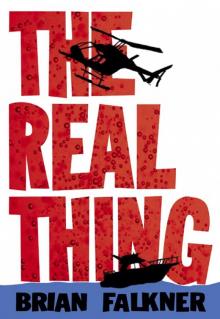 The Real Thing
The Real Thing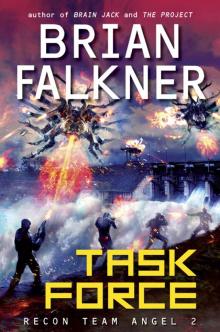 Task Force
Task Force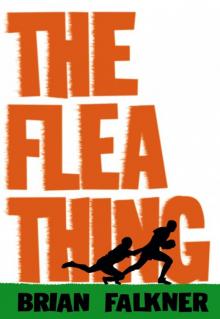 The Flea Thing
The Flea Thing The Project
The Project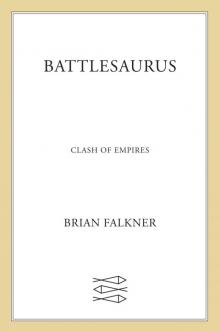 Clash of Empires
Clash of Empires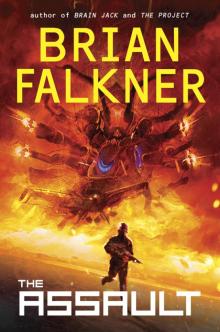 The Assault
The Assault Brain Jack
Brain Jack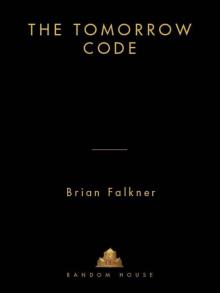 The Tomorrow Code
The Tomorrow Code Vengeance
Vengeance The Super Freak
The Super Freak Northwood
Northwood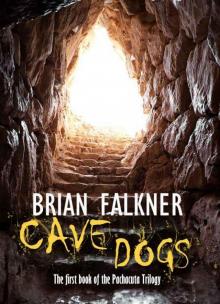 Cave Dogs (Pachacuta Book 1)
Cave Dogs (Pachacuta Book 1)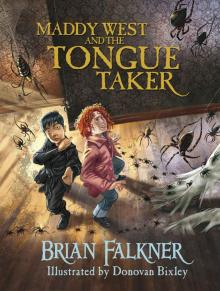 Maddy West and the Tongue Taker
Maddy West and the Tongue Taker